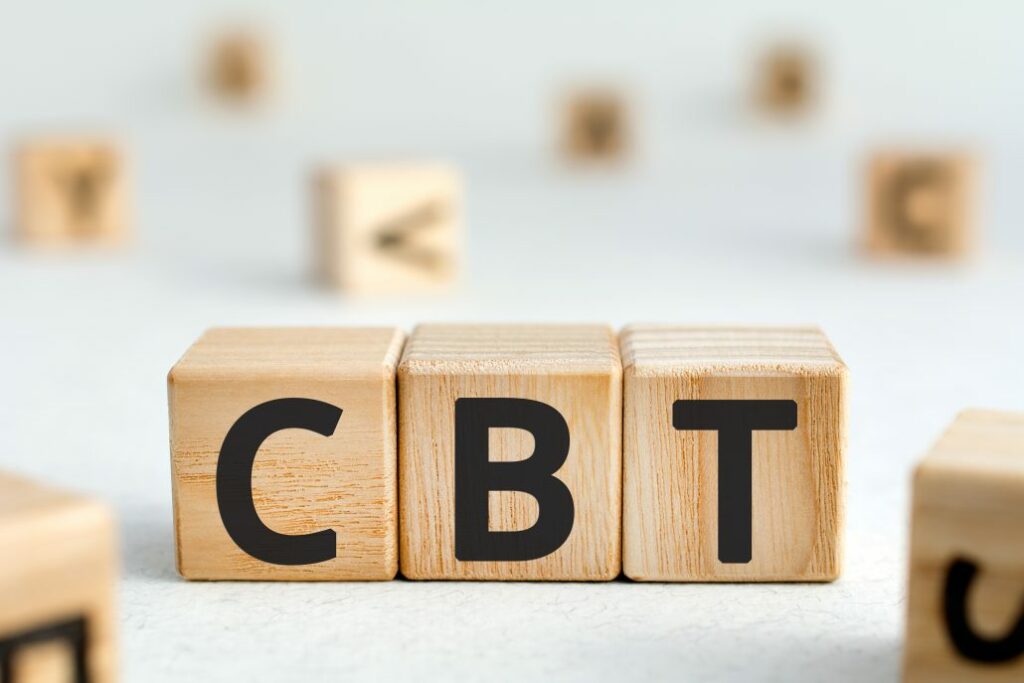If you are one of the millions of people struggling with anxiety, cognitive-behavioral therapy (CBT) may be a treatment option worth considering. CBT is a type of psychotherapy that focuses on changing negative thoughts and behaviors that contribute to anxiety disorders. In this blog post, we will discuss 15 proven CBT techniques for anxiety!
Contents
- 1 Defining Anxiety
- 2 Defining CBT
- 3 Top 16 CBT Techniques For Anxiety
- 3.1 Cognitive Restructuring
- 3.2 Trigger Identification and Avoidance
- 3.3 Relaxation Training
- 3.4 Stress Management
- 3.5 Problem-Solving
- 3.6 Positive Self-Talk
- 3.7 Desensitization
- 3.8 Sleep Hygiene
- 3.9 Psychoeducation
- 3.10 Cognitive Distraction
- 3.11 Pleasant Activities
- 3.12 Cognitive Biases
- 3.13 Mindfulness
- 3.14 Assertiveness Training
- 3.15 Time Management
- 3.16 Progressive Muscle Relaxation
- 4 Things To Consider
- 5 Alternative Therapies
- 5.1 Exposure therapy
- 5.2 Acceptance and commitment therapy (ACT)
- 5.3 Mindfulness-based stress reduction (MBSR)
- 5.4 Dialectical behavioral therapy (DBT)
- 5.5 Animal Assisted Therapy
- 5.6 Creative Arts Therapy
- 5.7 Interpersonal therapy (IPT)
- 5.8 Cognitive processing therapy (CPT)
- 5.9 Gestalt therapy
- 5.10 Eye movement desensitization and reprocessing (EMDR)
- 5.11 Group Therapy
- 5.12 Family Therapy
- 6 Other Treatment Options
- 7 Conclusion
Defining Anxiety
Anxiety is a normal human emotion that we all experience at one point or another. It is the body’s natural response to stress and can be helpful in certain situations (e.g., if you are about to take a test or give a presentation). However, when anxiety becomes overwhelming and interferes with our daily lives, it may be time to seek professional help.
Anxiety can manifest itself in many different ways. These ways can be physical, mental, or behavioral. These further can have short- or long-term effects on our lives.
Defining CBT
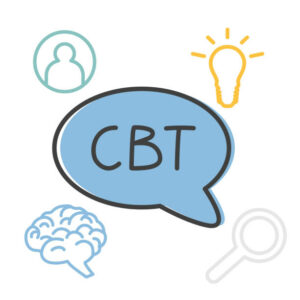
Cognitive-behavioral therapy (CBT) is a type of psychotherapy that focuses on changing negative thoughts and behaviors that contribute to anxiety disorders. The goal of CBT is to help people learn how to control their anxiety so it doesn’t control them.
CBT is usually conducted in weekly sessions for a period of several months. During CBT, you will work with a therapist to identify and challenge the negative thoughts and beliefs that are contributing to your anxiety. You will also learn coping and problem-solving strategies to manage your anxiety in healthy ways.
Top 16 CBT Techniques For Anxiety
Here are ten proven CBT techniques for anxiety:
Cognitive Restructuring
This technique involves identifying and challenging the negative thoughts that contribute to anxiety. For example, if you are anxious about giving a presentation, you may be thinking “I’m going to make a fool of myself” or “Everyone is going to judge me.” Cognitive restructuring helps you replace these negative thoughts with more realistic and positive ones.
Trigger Identification and Avoidance
Anxiety can be triggered by certain thoughts, events, or situations. Trigger identification and avoidance help you identify your triggers and develop strategies to avoid them. For example, if you are anxious about social situations, you may avoid trigger situations such as parties or networking events. This helps you manage your anxiety in the short term and can also help you develop longer-term coping strategies.
Relaxation Training
This technique involves learning how to relax your body and mind in response to anxiety-provoking situations. Relaxation techniques include deep breathing, progressive muscle relaxation, and visualization. These techniques can help you control your physical response to anxiety and prevent it from escalating into a full-blown panic attack.
Stress Management
This technique involves learning how to identify and manage the sources of stress in your life. This may involve developing healthy coping strategies, such as exercise, journaling, or time management skills. Stress management can help you reduce the overall level of anxiety you experience.
Problem-Solving
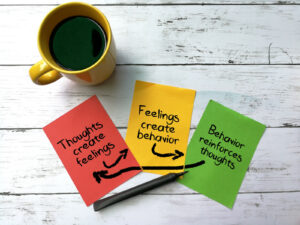
This technique involves learning how to effectively solve problems that are causing anxiety. Problem-solving skills can help you deal with stressful situations in a more productive way. This helps in anxiety by taking away some of the power that anxiety has over you. This helps our anxiety by taking away some of the power that anxiety has over us.
Positive Self-Talk
This technique involves talking to yourself in a positive and supportive way. This may involve giving yourself positive affirmations or using positive self-talk in moments of anxiety. Positive self-talk can help you reframe your thoughts in a more positive light and reduce the power that anxiety has over you.
Desensitization
This technique involves gradually exposing yourself to the things you are afraid of, in a safe and controlled environment. For example, if you are afraid of public speaking, desensitization may involve giving a presentation in front of a small group of people. Desensitization can help you confront your fears and learn that they are not as dangerous as you thought they were.
Sleep Hygiene
This technique involves making changes to your sleep habits in order to improve the quality of your sleep. This may involve things like avoiding caffeine before bed, establishing a regular bedtime routine, and creating an environment that is conducive to sleep. Sleep hygiene can help reduce fatigue and improve concentration, both of which can be affected by anxiety.
Psychoeducation
This technique involves learning about anxiety and how it affects the body and mind. Psychoeducation can help you understand your anxiety and learn how to manage it in a healthy way. It can also provide you with a sense of hope and empowerment. This can also help us understand our anxiety and learn how to manage it in a healthy way.
Cognitive Distraction
This technique involves focusing your attention on something other than the things that are causing anxiety. This may involve listening to music, reading, or spending time with friends and family. Cognitive distraction can help you take your mind off of anxious thoughts and give you a break from your stressors.
Pleasant Activities
This technique involves incorporating pleasant activities into your daily routine. Pleasant activities are things that make you feel happy and relaxed. They can include anything from taking a walk in nature to listening to your favorite music. Incorporating pleasant activities into your life can help reduce overall levels of anxiety and improve your mood.
Cognitive Biases
This technique involves identifying and challenging the cognitive biases that contribute to anxiety. For example, people with anxiety may have a “ negativity bias,” which means they tend to focus on negative thoughts more than positive ones. Challenging these cognitive biases can help reduce anxiety levels.
Mindfulness
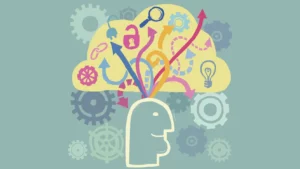
This technique involves paying attention to the present moment without judgment. Mindfulness can help you become more aware of your thoughts and feelings, and learn to accept them without getting caught up in them. It is a helpful tool for managing anxiety because it allows you to focus on the present moment instead of worrying about the future.
Assertiveness Training
This technique involves learning how to communicate in a clear, concise, and assertive way. Assertiveness training can help you stand up for yourself in situations where you might otherwise feel anxious or powerless. For example, assertiveness training may involve learning how to say “no” in a situation where you would normally feel obligated to say “yes.”
Time Management
This technique involves learning how to use your time more effectively. Time management skills can help you reduce stress and anxiety by giving you a greater sense of control over your life. Efficient time management can also help you free up time for activities that are enjoyable and relaxing.
Progressive Muscle Relaxation
This technique involves tensing and then relaxing different muscle groups in the body. Progressive muscle relaxation can help reduce anxiety by promoting relaxation and calmness. It can also help to increase awareness of the body and mind, which can be helpful in managing anxiety.
These are just a few of the many cognitive-behavioral therapy techniques that have been effective for treating anxiety. If you suffer from anxiety, consider seeking out a qualified therapist who can help you learn these skills. With time and practice, you can start to see a reduction in your symptoms and an improvement in your quality of life.
CBT is an effective treatment for anxiety that can help you learn to control your anxiety and live a more fulfilling life. If you think CBT can be right for you, talk to a mental health professional about starting treatment.
Things To Consider
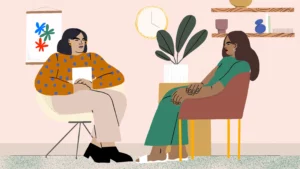
If you are thinking of starting CBT for anxiety treatment, there are a few things you should keep in mind.
- First, CBT is not a quick fix. It takes time and effort to learn the skills and put them into practice.
- Second, CBT is most effective when it is conducted by a therapist with appropriate qualification and training. It is important to find a therapist who you feel comfortable with and who has experience treating anxiety. You should also give importance to cross-verify their educational background and professional experience.
- It is also essential to figure out your costs upfront. CBT can be expensive, and you want to make sure that you can afford the treatment.
- Ensure that you are honest with your therapist about your anxiety and be ready to commit to the treatment. CBT is an excellent tool for managing anxiety, but it only works if you are willing to put in the time and effort.
- If you are considering self-help books or online resources, make sure they are based on proven CBT techniques. This will help ensure that you are getting the most effective treatment possible.
- Lastly, be patient with yourself and don’t expect perfection. CBT takes practice, but it can be an invaluable tool for managing anxiety. Don’t be discouraged if you don’t see results immediately. Like with any treatment, it may take some time to see improvement. Be patient and stick with it – the rewards will be worth it!
CBT is a commitment, but it is one that can pay off in the long run. If you are ready to put in the work, CBT can help you manage your anxiety and live a more fulfilling life.
Alternative Therapies
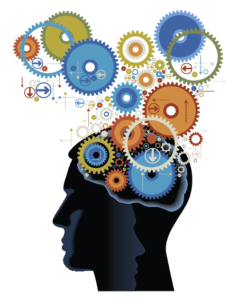
CBT is not the only treatment option for anxiety. There are many other effective therapies out there, such as:
Exposure therapy
This therapy involves gradually exposing yourself to the things you are afraid of. Exposure therapy can help you overcome your fears and live a more normal life. It helps to desensitize you to the things that trigger your anxiety and can help you learn to control your anxiety.
Acceptance and commitment therapy (ACT)
This therapy is based on the idea of accepting what is out of your control and committing to change the things that are within your control. ACT can help you learn to accept your anxiety and live with it in a more productive way. It can also help you develop a plan to make changes in your life that will improve your quality of life.
Mindfulness-based stress reduction (MBSR)
MBSR is a form of mindfulness meditation that has been shown to be effective in reducing stress and anxiety. MBSR can help you learn to focus on the present moment and become more aware of your thoughts and feelings. It can also help you learn to control your anxiety by teaching you how to respond to stressful situations in a more constructive way.
Dialectical behavioral therapy (DBT)
DBT is a type of cognitive-behavioral therapy that is designed to help people who suffer from mood disorders. DBT can be used to treat anxiety by teaching you how to manage your emotions and cope with stress in a more constructive way. It is beneficial for people who have difficulty regulating their emotions and who tend to react to situations in a negative way.
Animal Assisted Therapy
Animal assisted therapy is a type of therapy that uses animals to help people with mental health conditions. AAT can help to reduce anxiety by providing companionship, increasing social interaction, and reducing stress. AAT can also help you learn to control your anxiety by teaching you how to respond to stressful situations in a more constructive way. It involves working with a trained animal, such as a dog or horse, to help you achieve your treatment goals.
Creative Arts Therapy
Creative arts therapy is a type of therapy that uses art, music, or drama to help people with mental health conditions. It can be used to treat anxiety by helping you express your thoughts and feelings in a creative way. It can also help you learn to control your anxiety by teaching you how to respond to stressful situations in a more constructive way. This type of therapy can be beneficial for people who have difficulty communicating their thoughts and feelings.
Interpersonal therapy (IPT)
IPT is a type of therapy that focuses on your relationships with other people. It can be used to treat anxiety by helping you understand and manage your relationships. It can also help you learn to control your anxiety by teaching you how to respond to stressful situations in a more constructive way. IPT can be beneficial for people who have difficulty communicating their thoughts and feelings.
Cognitive processing therapy (CPT)
CPT is a type of therapy that helps you process and make sense of your thoughts and feelings. It can be used to treat anxiety by helping you understand your thoughts and feelings. It can also help you learn to control your anxiety by teaching you how to respond to stressful situations in a more constructive way. CPT can be beneficial for people who have difficulty understanding and processing their thoughts and feelings.
Gestalt therapy
Gestalt therapy is a type of therapy that focuses on your here-and-now experience. It can be used to treat anxiety by helping you become more aware of your thoughts and feelings. It can also help you learn to control your anxiety by teaching you how to respond to stressful situations in a more constructive way. Gestalt therapy can be beneficial for people who have difficulty connecting with their emotions.
Eye movement desensitization and reprocessing (EMDR)
EMDR is a type of therapy that uses eye movements to help you process and make sense of your thoughts and feelings. It can be used to treat anxiety by helping you understand your thoughts and feelings. It can also help you learn to control your anxiety by teaching you how to respond to stressful situations in a more constructive way. EMDR can be beneficial for people who have difficulty understanding and processing their thoughts and feelings.
Group Therapy
Group therapy is a type of therapy that involves meeting with a group of people to discuss your thoughts and feelings. It can be used to treat anxiety by providing support and understanding from others. It can also help you learn to control your anxiety by teaching you how to respond to stressful situations in a more constructive way. Group therapy can be beneficial for people who feel isolated and alone.
Family Therapy
Family therapy is a type of therapy that focuses on your relationships with your family members. It can be used to treat anxiety by helping you understand and manage your relationships. It can also help you learn to control your anxiety by teaching you how to respond to stressful situations in a more constructive way. Family therapy can be beneficial for people who have difficulty communicating their thoughts and feelings.
These are just a few of the many alternative therapies that are available for treating anxiety. If you are interested in exploring alternative therapies, talk to your mental health professional about what might be right for you. Each person responds differently to different treatments, so it is important to find what works best for you.
Other Treatment Options
If you are seeking treatments other than therapy, there are still a variety of sources available for your betterment.
Medication
Medicine for anxiety can be helpful for some people. It is important to talk to your doctor about the risks and benefits of taking medication for anxiety. Some common medicines for anxiety include:
•benzodiazepines
•beta-blockers
•antidepressants
Herbal supplements
Some people use herbal supplements to help with anxiety. It is important to talk to your doctor about the risks and benefits of taking herbal supplements. Some common herbs used for anxiety include:
•kava kava
•valerian root
•chamomile
Acupuncture
Acupuncture is a type of alternative therapy that involves inserting needles into the skin. It helps to treat anxiety by helping you relax and feel less anxious. Acupuncture can be beneficial for people who show interest in exploring alternative therapies.
Yoga
Yoga is a type of exercise that involves stretching and breathing exercises. It can treat anxiety by helping you relax and feel less anxious. Yoga can be beneficial for people who are interested in exploring alternative therapies.
Meditation
Meditation is a type of mindfulness practice that involves focusing on your breath and clearing your mind. It can be used to treat anxiety by helping you relax and feel less anxious. Meditation can be beneficial for people who are interested in exploring alternative therapies.
Massage Therapy
Massage therapy is a type of therapy that uses touch to help people with mental health conditions. It can be used to treat anxiety by helping you relax and reduce stress. It can also help you learn to control your anxiety by teaching you how to respond to stressful situations in a more constructive way. This type of therapy can be beneficial for people who have difficulty regulating their emotions and who tend to react to situations in a negative way.
Biofeedback
Biofeedback is a type of therapy that uses technology to help you manage your anxiety. It helps you learn to control your anxiety by teaching you how to respond to stressful situations in a more constructive way. It can also help you understand your thoughts and feelings by providing information about your body’s response to anxiety.
Lifestyle Changes
Making lifestyle changes can also help reduce anxiety. Some lifestyle changes that may help include:
•exercising regularly
•eating a healthy diet
•getting enough sleep
•avoiding alcohol and drugs
These are just a few of the many different ways that you can treat anxiety. If you are interested in exploring treatment options, talk to your mental health professional about what might be right for you. Anxiety is a treatable condition, so do not hesitate to seek out help if you are struggling. Remember, there is no shame in seeking help for anxiety or any other mental health condition. Seeking treatment is a sign of strength, not weakness.
Conclusion
In conclusion, there are a variety of different treatments available for anxiety. If you are struggling with anxiety, talk to your mental health professional about what might be right for you. There is no shame in seeking help for anxiety or any other mental health condition. Seeking treatment is a sign of strength, not weakness. Remember, there are many people who care about you and want to see you succeed. So reach out for help when you need it and know that there is always hope for a better tomorrow.
For more information, please contact MantraCare. Anxiety is a common mental health condition characterized by persistent feelings of worry, fear, and apprehension. If you have any queries regarding Online Anxiety Counseling experienced therapists at MantraCare can help: Book a trial Anxiety therapy session
